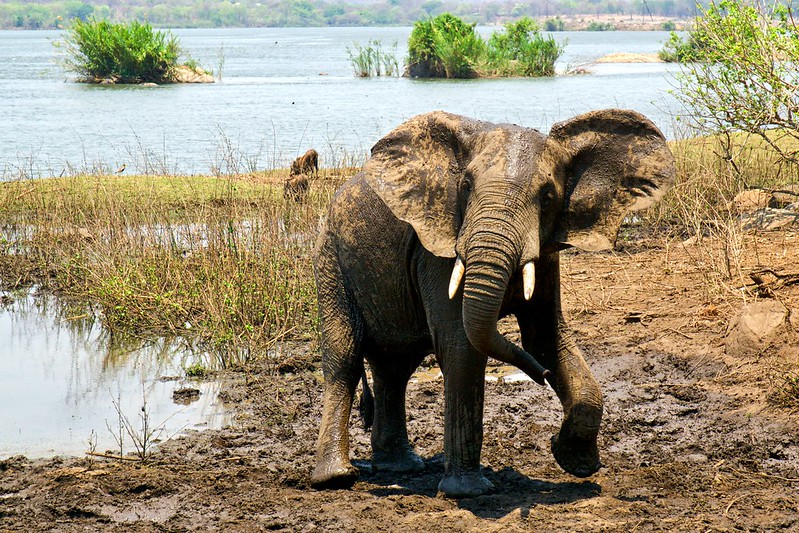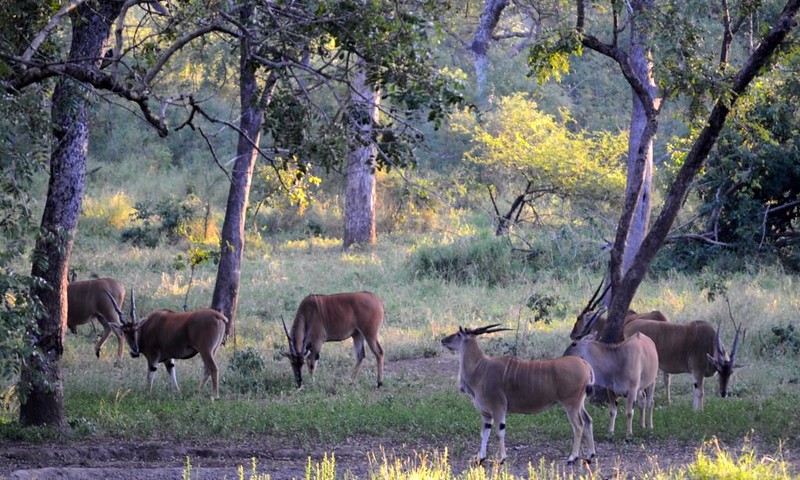From poacher to bee-keeper: the story of Chikondi
Documented by John Njunga, African Parks, with additional writing and reporting from Emmanuel Chirwa, BRACC Hub
Living in harmony with nature has proven its benefits to villagers surrounding Majete Wildlife Reserve. Through apiculture (beekeeping), villagers have now migrated from abject poverty to middle income households, thanks to the visionary management of Majete Wildlife reserve by the African Parks. Some villagers now own livestock, have better houses and are able to send their children to school with ease, a thing they couldn’t do in the past.
People in a war against nature
Villagers surrounding Majete Wildlife Reserve had for a long time encroached the game reserve to poach animals and cut trees for charcoal making. Chikondi (age 45 – not his real name), narrates how he and other members of his community wiped out game in the reserve.
“In 1989, I would go into the reserve and hunt sable, waterbucks and kudu. I would hunt with dogs. This was the means of earning money. Other villagers would hunt elephants. They had muzzle loading guns,” he said.
Elephants were hunted for meat but mostly for their tusks. Despite being a subject of national pride and the possession of them being illegal, elephant tusks are in high demand. Buyers were mostly from cities. Chikondi, too, would have killed elephants had he had the guns.
Elephants were not the only species targeted for their tusks. Rhinos which used to roam the reserve became locally extinct as people killed them all. They got wiped out for their horn, which was believed to have magical value and able to make one rich (this belief has never been proven).
Such was the way of living for Chikondi and colleagues.

The turning point
Chikondi and the other poachers reached a point where they had finished all the animals in the reserve and were "about to shoot themselves" because the only movement they would see in the park were the other poachers -- signifying that there were no animals left.
By the late 1990s, Chikondi and the community realised that a lot of animals had been killed and they were in trouble. Hence, they started cultivating farms. Chikondi also started beekeeping for the production of honey for his own consumption. This coincided with African Parks assuming management of Majete Wildlife Reserve and a promise to the community that they wanted to collaborate with them and enable them to benefit from the reserve. But most community members, Chikondi included, thought it was just a lie, a “blue lie”.
However, he started to believe what African Parks was saying, as they immediately started working with the community and facilitated their access to the market, to sell their honey. Chikondi was able to move from home consumption to generating a reliable income. Through the years, African Parks has gone even further and provided community members with equipment and modern hives to replace their traditional tree-bark hives.
In the past Chikondi didn’t like beekeeping much as there were no markets, and he was always getting stung. However, now he is always happy when he is doing beekeeping: he has been provided with bee suits and he is able to operate freely. He knows that what he harvests will be sold through the market and it makes him really content.
Today, he feels he is living a better life than when he was a poacher because despite killing wildlife, as a poacher has was never able to produce the benefits that he and his family have today.
The family, including wife Patricia (35), his son and three daughters have managed to generate a reliable income from beekeeping and attain a better life. Chikondi has constructed three houses which provide a home for him and his relatives, he owns three acres of land, is now able to support his children and he has purchased a motorbike - all from the sales of honey. He owns 25 beehives, 22 top bar hives and 3 Langstroth generating approximately 360,000 kwacha (£380) every six months from the sale of honey. Most of the time he uses the money to buy household items and invest in buying more beehives.
Chikondi, who has lived in the Majete area for 45 years, has seen a lot of things change since African Parks started managing Majete in 2003. He has seen five clinics constructed, school blocks being built, scholarship programmes for the children and has seen Majete Wildlife Reserve bounce back to the old days of the community’s forefathers.
Chikondi feels so happy today as he is now able to see the animals he used to see when he was younger and even those animals that he didn't get the opportunity to see as his forefathers killed them.
Malawi as a country is benefitting because lots of tourists are coming with their money and spending at the park and as a result, the reserve is adding value to the economy, he remarked. He is also happy that African Parks is trying to enrich Malawi’s other protected areas with the help of wildlife translocations.
Today, he always feels bad when he hears someone is going to poach, as his family has seen a lot of benefits from conservation and because the park is now properly managed. He is one of the community members that the reserve turns to when they need help extinguishing fires. He advises fellow villagers that they need to stop poaching if they do have those intentions - and they must, rather, start raising bees.

Hope in the midst of challenges
The family still face challenges such as the availability of portable safe water, access to health services and the changing climate. During the rainy season, it is difficult for the family to cross the river and collect water which means they are cut off from their only source of clean water. Second, they face challenges accessing health services as most of the time they have to travel more than 6km away to get help.
He has also witnessed first-hand that there are problems with rainfall (acute rainfall patterns or no rains at all) because of the deforestation in the area. Last year, the heavy rains affected most of their gardens and crops and they didn’t harvest much. Many community members are in hunger now. The rain and hail were so severe in some cases that people ended up losing their houses as well. Luckily, many of the beehives were not affected, as they were resilient to the harsh weather conditions.
Chikondi also shared that trees are very important as you cannot establish an apiary site if there are no trees, so there is a direct connection between beekeeping and trees- and hence, between the forested reserve and the bees.
“Bees normally come from where there are big trees, where the trees produce flowers so that they can collect nectar. So immediately we establish apiary site close to the reserve and rest assured that bees will come and most of the time they come from the protected area,” he said.
Chikondi’s wish for his family is to see his children going further in education, as he feels that education is the key to success, and he also hopes to buy a car for his family. In terms of beekeeping, his vision for beekeeping is to see more beekeepers generating more money. There are lots of people who need support -- it's not that they are lazy, they just need help, he stresses.
He also hopes that one day he can find support to travel and learn about beekeeping practices in other areas. Learning visits motivate people because “if you go and see how people are doing, you try to pull up your socks to reach the level of the [other] colleagues”.
Image credits: Top - Majete wildlife reserve, courtesy D Davis; Bottom - Majete wildlife reserve, courtesy D Cockburn
